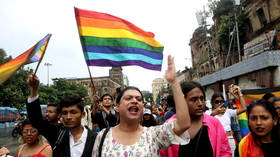India’s Supreme Court refuses to back gay marriage

India’s Supreme Court on Tuesday declined to legally recognize same-sex marriages, leaving the decision to Parliament and state legislatures to validate such unions legal, Indian media are reporting.
A bench of India’s highest court, delivering its eagerly-awaited verdict on a batch of pleas seeking legal backing for same-sex marriages in the country, held that it is beyond the remit of courts to issue a positive direction to the legislature regarding the issue.
“The court can’t make law but only interpret it and it is for Parliament to change the Special Marriage Act,” Chief Justice of India (CJI) D Y Chandrachud said. “The court can neither strike down nor read words into the Special Marriage Act to include same-sex members within the ambit of the 1954 law,” the CJI’s order read. Apart from Chandrachud, the bench also comprised Justices Sanjay Kishan Kaul, S Ravindra Bhat, Hima Kohli, and PS Narasimha.
The Special Marriage Act of 1954 is an Act of the Parliament of India with provision for civil marriage for people of India and its nationals overseas. Petitioners in support of same-sex marriages have argued for an interpretation of this Act “in a gender-neutral manner where a person is not discriminated against due to sexual orientation.”
Despite the verdict, the CJI noted that the institution of marriage has “undergone a sea change” and it is not static. “The meaning of liberty is the ability to be who one wishes to be,” he added.
The five-judge bench also ruled that non-heterosexual couples cannot be granted the right to jointly adopt a child. However, Chandrachud struck down the Central Adoption Resource Authority’s (CARA) regulation that restricted queer and unmarried couples from adopting children. CARA, a statutory body, is affiliated with India’s Ministry of Women and Child Development.
Meanwhile, Chandrachud has asked the federal government to constitute a committee to “decide the rights and entitlements of persons in queer unions.” The committee will address the practical concerns of same-sex couples, such as getting ration cards, pensions, and succession issues. The CJI has also directed India’s federal and state governments to “ensure that the queer community is not discriminated against” because of their orientation.
Law cannot make an assumption about good and bad parenting based on the sexuality of the parents: CJI DY Chandrachud#SupremeCourtofIndia#SameSexMarriage#MarriageEquality#SupremeCourtpic.twitter.com/1gjeVcvbEX
— Bar & Bench (@barandbench) October 17, 2023
In March, the Supreme Court had referred several petitions seeking legal recognition for same-sex marriages in the country to a constitution bench of five judges of the court, on the grounds that these petitions were “seminal” and an “important matter.”
The petitioners included same-sex couples, rights activists, and various organizations, who challenged the constitutionality of the existing legislation, including the Special Marriages Act, Hindu Marriage Act, Foreign Marriage Act and others. Raising its objection, the Indian government filed a plea asking the Supreme Court to quash these petitions, saying that the “creation of a new social institution” is beyond the ambit of the judiciary.
The petition, filed by India’s Solicitor General Tushar Mehta, called same-sex marriage an “urban elitist concept far removed from the social ethos of the country.” Chandrachud, however, maintains that “people may be queer regardless of whether they are from small towns, urban or semi-urban areas.” Mehta’s petition argued that biological gender defined a person’s gender, which was challenged by Chandrachud. “There is no absolute concept of a man or an absolute concept of a woman at all,” he said.
The Narendra Modi-led government has staunchly maintained that the matter of same-sex marriages is best left to the legislature “to deliberate and decide upon.” The Supreme Court’s verdict comes nearly five years after the country decriminalized homosexuality. In September 2018 the five-judge Bench partially struck down Section 377 of the Indian Penal Code, decriminalizing same-sex relations between consenting adults. The bench then, however, clarified that the verdict should not be construed as “conferring any right, including the right to marry.”












